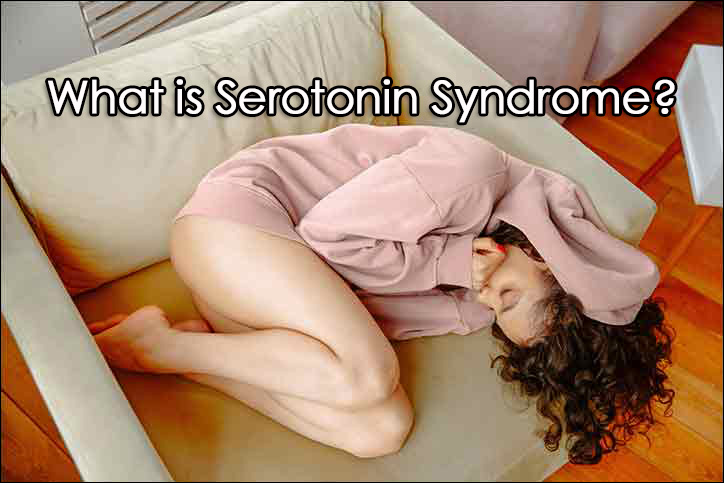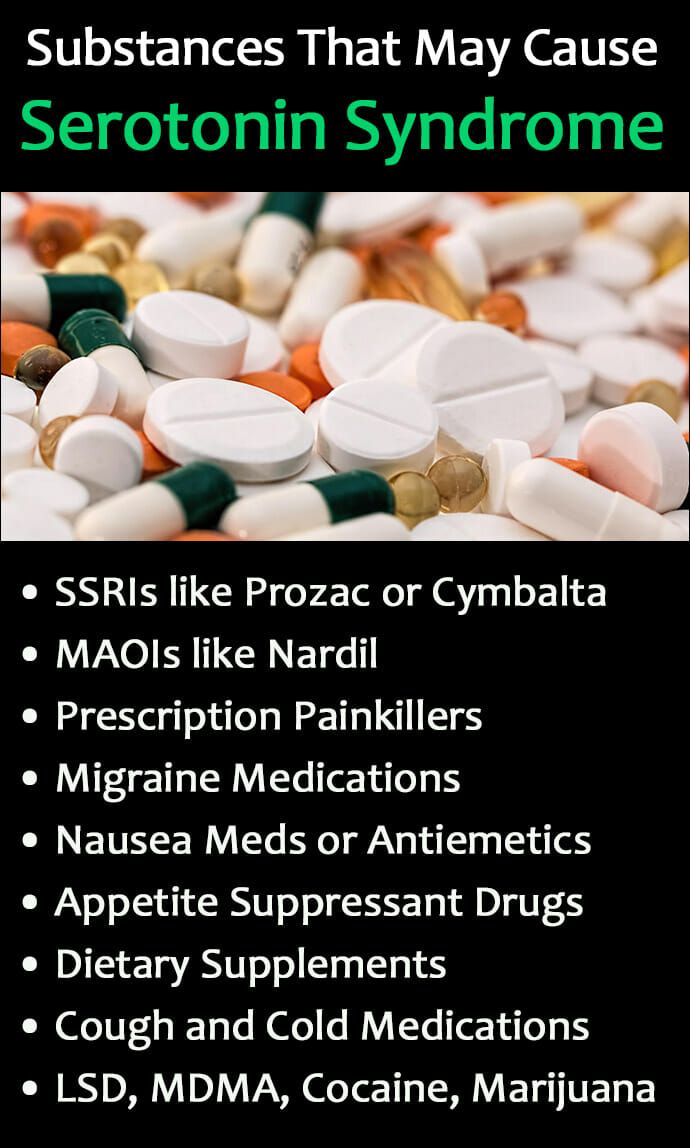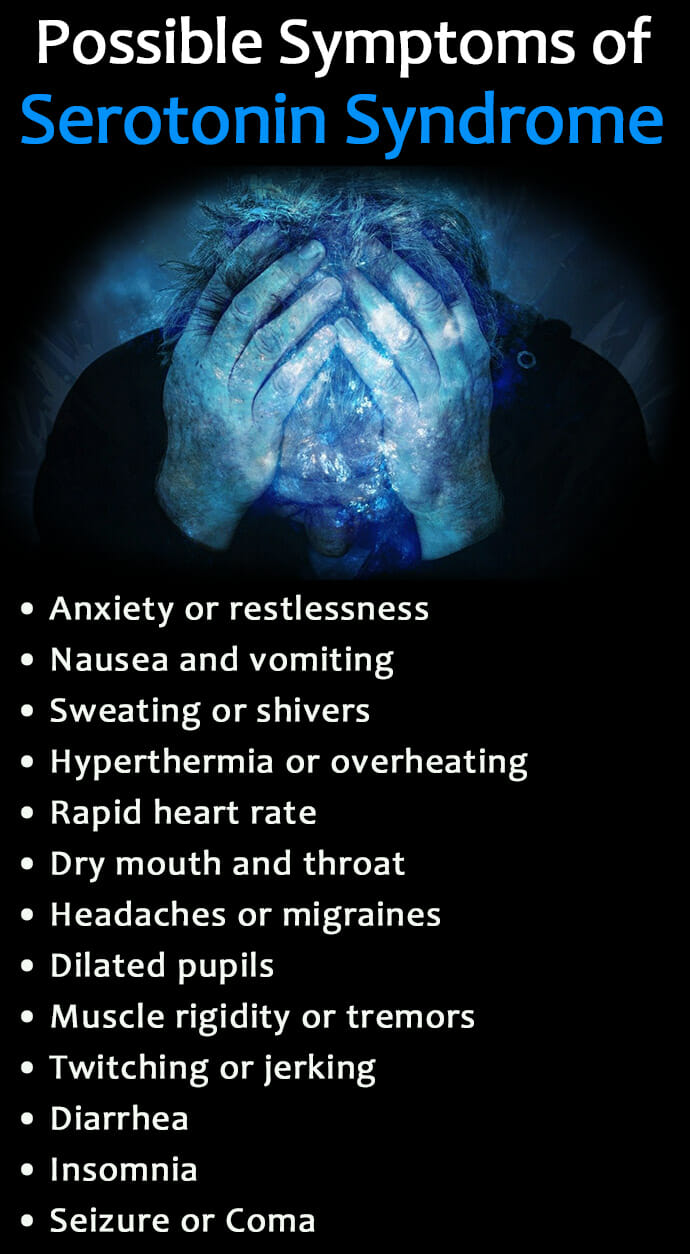Table of Contents
Many of us think of serotonin as a feel-good chemical in the brain that makes us happy. While this is true, its effect on the body is actually quite complex and too much of it can cause an unhealthy condition known as serotonin syndrome.
Serotonin is a neurotransmitter, or chemical messenger, that helps in the function of key bodily functions, such as breathing, blood flow, body temperature, and digestion.
It’s widely known to play an important role in mood. However few people understand that too much serotonin can produce mild serotonin syndrome symptoms, which may become severe if not addressed.
What is Serotonin Syndrome?
Serotonin syndrome is a reaction to certain drugs or substances that create too much serotonin in the body.
Though the symptoms may start as mild, in rare instances the condition can be potentially life threatening if it’s not diagnosed and treated.
Contrary to popular belief, nearly 90 percent of serotonin is created in the gut and intestinal area, and not in the brain. Because of this, serotonin syndrome often produces excessive activity in the nerve cells, so it impacts the entire body.
Healthcare providers began to recognize the condition in the 1960s, after the first antidepressant medication was approved to increase serotonin levels in the body.
There are a variety of serotonergic medications that increase levels of serotonin for treating conditions like high functioning depression, anxiety, and others. These are generally safe to use as directed and have been helpful for many people.
But any person of any age who takes herbal or over-the-counter supplements, as well as prescription or illegal drugs that affect the production of serotonin can be at risk of developing serotonin syndrome when taken in high doses.
Common Serotonin Syndrome Causes
In general, most people can safely use medications that create serotonin as long as the prescribed dosage is appropriate, and the healthcare provider has a clear understanding of what other medications or drugs a patient is taking.
Serotonin syndrome is most likely to develop when two or more drugs or serotonergic medications that aid in production of the neurotransmitter are taken together.
Common causes of serotonin syndrome include:
- Polysubstance abuse of taking two or more substances together that increase serotonin production, whether they are prescription medications, illegal drugs, or supplements
- A new prescription medication interacts with an existing one to create an excess of serotonin in the body
- An inappropriate dosage of a serotonergic medication is prescribed
- Misusing prescription or illegal drugs that unknowingly create too much serotonin in the brain or body
Mixing different substances that increase serotonin isn’t always easy to recognize because many people don’t know which drugs or medications fall into this category.
Even certain foods that boost serotonin may cause an unhealthy interaction.
This is why it’s necessary to be open and honest with your doctor when considering new medications and let him or her know about all legal or illegal drugs that are currently being used, including supplements.
Substances that can create too much serotonin in the body include:
- Selective Serotonin Reuptake Inhibitors (SSRIs) like Prozac or Cymbalta for depression and anxiety
- Monoamine Oxidase Inhibitors (MAOIs) such as Nardil and others for depression and anxiety
- Prescription painkillers including some opioids
- Migraine medications
- Prescription or over the counter nausea medications known as Antiemetics
- Appetite suppressant drugs
- Dietary supplements such as ginseng or St. John’s Wort
- Cough and cold medications containing dextromethorphan like Mucinex
- Illegal drugs including LSD, MDMA, cocaine, or marijuana
- Certain types of food
Using any one of these substances by itself at the recommended dosage usually will not cause any problems.
But taking too much of one, or a combination of others, such as mixing an SSRI like Lexapro and marijuana could be unhealthy or dangerous.
It’s important to understand and recognize the symptoms and seek medical attention to prevent serious or dangerous health complications.
Serotonin Syndrome Symptoms
Some people may start to experience serotonin syndrome symptoms within hours of taking a new medication or an illegal drug that creates an interaction with an existing prescription or other medication.
Signs of too much serotonin include:
- Anxiety, agitation, restlessness, or disorientation
- Nausea and vomiting
- Fever, sweating, flushed skin, or shivers
- Hyperthermia, which is a condition where the body overheats
- Increased or rapid heart rate
- Dry mouth and throat
- Headaches or migraines
- Dilated pupils or roving eye movements
- Muscle rigidity, spasms, or tremors
- Twitching or jerking
- Diarrhea or an increase in sounds coming from the bowels
- Insomnia
In serious cases, toxic levels of too much serotonin can lead to:
- Unresponsiveness
- Loss of consciousness
- Seizures
- Coma
Most people who develop serotonin syndrome will experience some of the above issues within 24 hours, if not sooner. It is extremely important to seek treatment for serotonin syndrome symptoms if they appear.
Serotonin Syndrome Treatment
Serotonin syndrome treatment begins with a diagnosis to rule out similar conditions because there isn’t a single test that can confirm the presence of the condition.
A physical examination is generally required as well as an open and honest discussion about all medications and drugs you have recently used, or you are currently taking.
With mild serotonin syndrome, stopping the medication may be enough to solve the issue. This requires a thorough discussion with a doctor first because not all medications can be stopped immediately and may need to be tapered appropriately.
For more severe symptoms, a physician might require that a patient be monitored in the hospital for 24 hours.
At toxic levels, some of the follow treatments could be recommended:
- Benzodiazepines, such as Valium or Ativan, can help stop seizures and ease anxiety, as well as muscle stiffness
- Taking IV fluids to help with hydration
- Breathing oxygen through a mask to increase blood oxygen levels
- Medications that help control blood pressure and heart rate
- Serotonin blocking medications to slow production of the neurotransmitter in the body
- In the case of hyperthermia or an extremely high fever, a breathing tube and machine might be used, as well as medications to temporarily paralyze the muscles
Mild serotonin syndrome symptoms usually improve within two to three days after a person stops taking all substances that caused increased serotonin levels in the body.
In very serious cases, it can take several weeks for the body to fully recover and get back to normal functioning.
Serotonergic medications are helpful for many individuals. But it’s necessary to understand the possible risks of serotonin syndrome when they are not used as directed, or when mixed with other substances.
Frequently Asked Questions
How common is serotonin syndrome?
Serotonin syndrome is not very common for most people who follow the guidelines when taking a serotonergic medication as prescribed by a doctor.
The risk increases for people who are taking multiple medications that elevate serotonin, and those who mix them with illicit drugs and certain types of supplements.
Can too much serotonin cause anxiety?
Yes, too much serotonin can cause anxiety for some individuals.
Even though serotonin is a neurotransmitter associated with mood, a low-level increase generally improves anxiety symptoms, while high levels of too much serotonin can worsen anxiety.
Anxiety symptoms may be most noticeable when staring a new SSRI medication or increasing the dose of an existing one.
How do you know if you have serotonin syndrome?
Serotonin syndrome symptoms usually begin within a few hours after taking or mixing prescribed or illicit serotonergic substances.
Early warning signs can include:
- Anxiety, confusion, or feeling agitated
- Rapid heart rate
- Sweating, shivering, or fever
- Rigid muscles or spasms
- Loss of balance or coordination
- Headache
- Nausea or diarrhea
The symptoms can be mild or severe and may not appear all at the same time.
How long does serotonin syndrome last?
Mild serotonin syndrome symptoms generally last for one to three days after the substance causing the issue has been discontinued.
Depending on the medication and severity of symptoms, it’s possible prolonged symptoms may continue for days or weeks. Prozac (Fluoxetine) and some MAOIs may cause sustained serotonin syndrome symptoms, especially if not treated.
What are the long-term effects of serotonin syndrome?
Cases of mild serotonin syndrome usually don’t cause long-term side effects, although extreme cases can lead to some of the following issues:
- Memory and cognitive impairment
- Muscle pain and stiffness
- Organ damage to the kidneys or liver
- Tardive Dyskinesia
- Insomnia and sleep issues
- Anxiety
What medications are associated with serotonin syndrome?
Serotonergic medications or substances that increase serotonin levels in the brain and body are the most common causes of the condition.
These include:
- SSRI Antidepressants (Lexapro, Prozac, Zoloft)
- SNRI Antidepressants (Cymbalta, Effexor, Pristiq)
- MAOI Antidepressants (Nardil)
- Opioids (Oxycodone, Tramadol)
- Cough Medication (Dextromethorphan)
- Migraine Medications
- Some antibiotics
- Cocaine and amphetamines
- Marijuana
- MDMA (ecstasy)
- LSD
Serotonin syndrome can be caused by mixing these substances or taking only one of them in very high doses.
Are headaches one of the most common serotonin syndrome symptoms?
Headaches are certainly one symptom of serotonin syndrome, but more common symptoms generally include tremors, dizziness, restlessness, mental confusion, muscle spasms, and elevated heart rate and blood pressure.
How can serotonin syndrome be prevented?
Following all warning guidelines and only taking medications as prescribed by a doctor in the correct dosage is one of the best ways to prevent serotonin syndrome.
When taking a new medication, always let your doctor know about any other drugs you might be taking, including supplements and recreational substances.
Do not mix medications, substances, or supplements without consulting with a doctor first, and do not increase the dose above what is prescribed.
If any health issues arise while taking a medication, speak with the doctor as soon as symptoms occur.
Discontinuing the use of some prescription meds can cause other problems unless advised by a doctor.
Are there any supplements or herbs that can increase the risk of serotonin syndrome?
Yes, some supplements and herbal substances like St. John’s Wort, ginseng, and L-Tryptophan may increase the risk serotonin syndrome when taken in high doses or mixed with other serotonergic medications.





